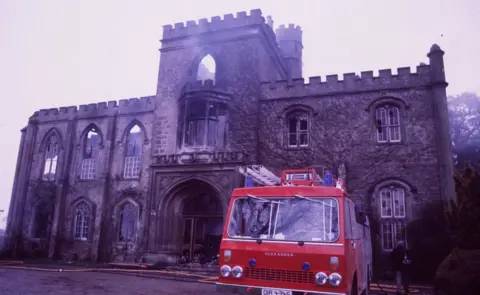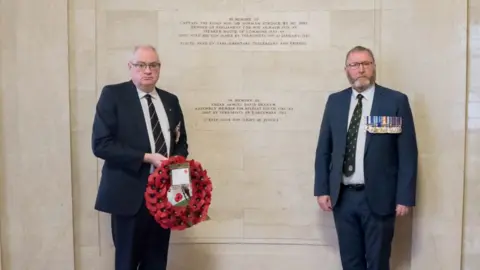Tynan murders: NI Speaker and son remembered 40 years on
 Pacemaker
Pacemaker
A former Stormont Speaker and his son, who were killed by the IRA in 1981, have been commemorated on the 40th anniversary of the murders.
Sir Norman Stronge, 86, and his son James, 48, were shot at their County Armagh mansion on 21 January 1981.
The historic building, Tynan Abbey, was then set on fire by their IRA killers.
Both men were high-profile members of the Ulster Unionist Party (UUP) and party colleagues have paid tribute by laying wreaths at Stormont and Tynan.
James Kingan, who lost his grandfather and his uncle in the attack, said his life changed forever on the night they were killed.
A gang of "up to 14" IRA men were involved in the murders, he told the BBC's Good Morning Ulster programme.
"They were armed with sub-machine guns, grenades," Mr Kingan said.
"They blew in the front door and found my grandfather and uncle in the library... my grandfather was 86 and quite deaf, so always had the television full on."
He added that after killing his loved ones, the gunmen placed incendiary devices around their home and set the building ablaze.
 Pacemaker
Pacemaker
Although the Stronges were high-profile unionists, the scale of the attack on their rural family home caused widespread shock and outrage.
It made the pages of the New York Times, which said the murders had added to the fears of Protestants living close to the Irish border.
Both father and son were former soldiers as well as being former members of the old Northern Ireland parliament at Stormont (then called MPs).
Sir Norman was a World War One veteran who fought in the Battle of the Somme and was awarded the Military Cross.
 Pacemaker
Pacemaker
He represented the Mid-Armagh constituency at Stormont and also served as Stormont Speaker for more than 23 years, from 1945 to 1969.
His only son James had been a soldier in the Grenadier Guards before becoming a part-time policeman with the Royal Ulster Constabulary (RUC).
James served as Mid-Armagh MP at Stormont after his father until the parliament was dissolved in 1973.
On the eve of the 40th anniversary of their deaths, UUP leader Steve Aiken and fellow assembly member Doug Beattie laid a wreath at Sir Norman's memorial stone at Stormont.
 Ulster Unionist Party
Ulster Unionist PartyMr Aiken described the double murders as a "heinous and callous crime against two defenceless men".
"The brutal IRA gang murdered two good men, who had given so much in the service of their country, and then to compound the evil they committed, the terrorists set fire to their home."
On Thursday morning, the party's former MEP Jim Nicholson joined UUP colleagues to lay wreaths at their graves at Tynan parish church.
Mr Nicholson worked with James Stronge when the latter was a Stormont MP and said he and his father were "two of the finest gentlemen that you could meet".
"The bravery of Sir Norman - a World War One veteran, who was decorated with the Military Cross for his service at The Somme, and the Belgian Croix de Guerre - is in stark contrast to the cowardly terrorists who murdered an 86-year-old man and his son," he added.
Allow X content?

The former MEP said the murders of the two leading unionists near the border "was designed to strike fear and trepidation into the rest of the people living in those areas".
Sir Norman's grandson said it is important that attacks like Tynan Abbey are remembered, to prevent people repeating the mistakes of the past.
Mr Kingan added that he is very proud of his grandfather and uncle as they "stood up for what they believed in".
"Sadly they had to pay with their lives, but democracy is a very precious thing, you don't want to lose it."
Mr Kingan said that what he misses most about his grandfather was "his great sense of humour".
"Everything just changed after that night, the world changed," he recalled.
"Before it was one thing and after it, you were different - you looked the same but you were different."
